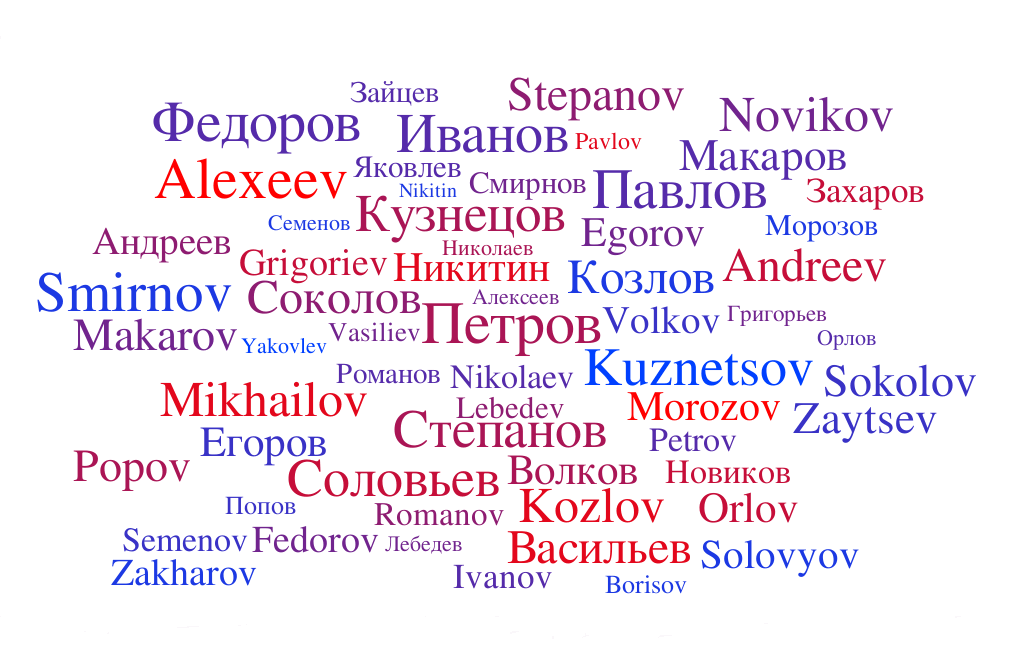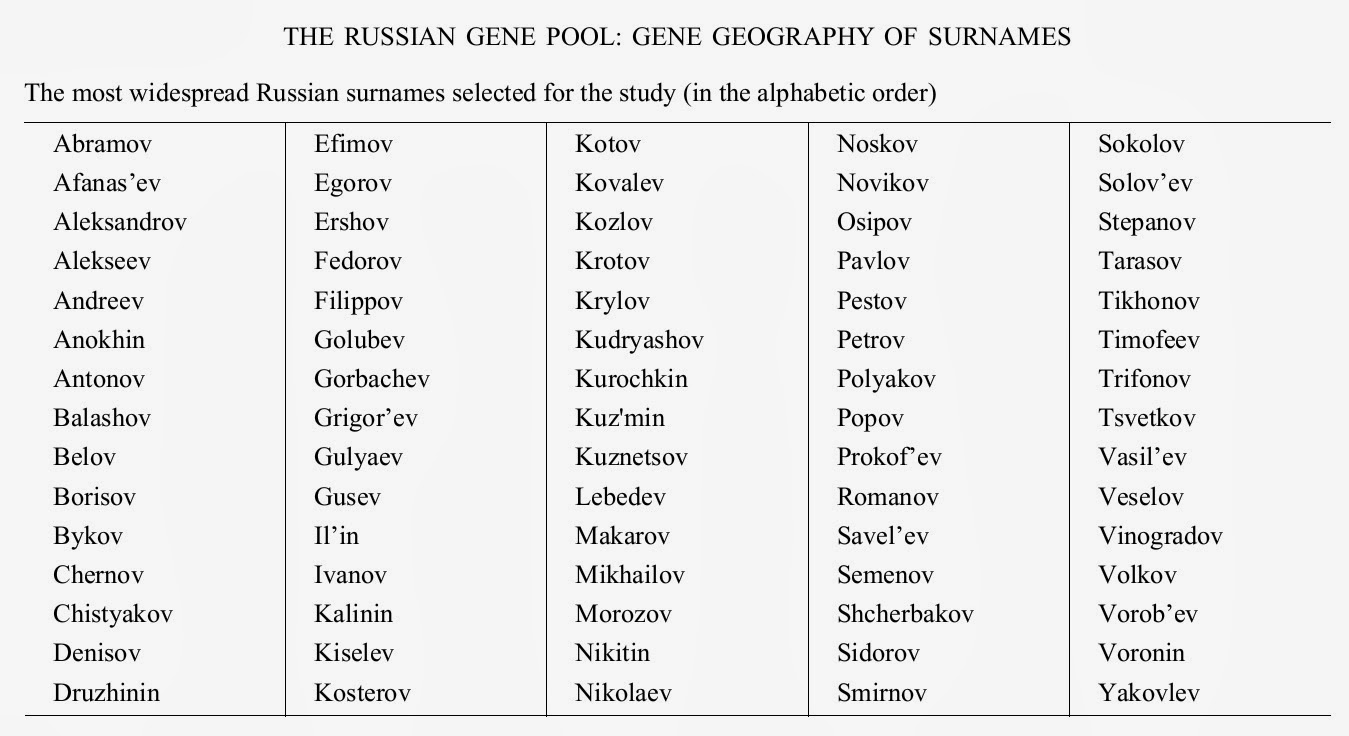Ever wondered about the stories etched into the very fabric of Russian identity? Russian surnames, far from being mere labels, are vibrant threads woven into the rich tapestry of history, culture, and heritage, revealing fascinating insights into the nation's past and the lives of its people.
The world of Russian surnames is a captivating realm, filled with a multitude of origins and meanings, each reflecting the unique circumstances and influences that have shaped Russian society over centuries. From the nobility to the peasantry, the evolution of these names offers a glimpse into the social dynamics, occupations, and beliefs that have defined the Russian experience. As we delve deeper, well uncover the historical context, the cultural nuances, and the sheer diversity of these names.
Consider the sheer volume of distinct surnames. Forebears estimates over 1,424,981 unique surnames in Russia. This sheer number underscores the diversity of the Russian people and the intricate web of origins that contribute to the nation's identity.
- Yupmoviecom Netflix Your Ultimate Streaming Haven
- Wasmo Telegram Vip Your Ultimate Guide To Unlock Exclusive Content
Let's consider a well-known example: Ivanov. This surname, the most common in Russia, literally translates to "son of Ivan". It speaks to the historical prevalence of the name Ivan and the patronymic naming system that was so crucial in Russian society. It reflects the connection to ancestral roots, and the enduring power of tradition. Other common examples, like Petrov (son of Peter) and Smirnov (meaning "quiet" or "calm"), provide similar insights, demonstrating how names often reflected either lineage or personal characteristics.
But what about the origins? During the 19th century, the most common surnames in Russia, such as Ivanov, Sidorov, Petrov, and Vasiliev, were often derived from patronymic or occupational origins. Later, during historical periods, the rise of Christianity in ancient Rus', the Russian Revolution of 1917, and the Soviet years all contributed to the evolution of Russian surnames.
Here's a closer look at some of the prominent surnames and their meanings:
- Unveiling The Power Of Aagmalnet Your Ultimate Guide To Success
- Bollyflixcom Vip Your Ultimate Guide To Streaming Bollywood Movies
| Surname | Meaning | Origin |
|---|---|---|
| Ivanov | Son of Ivan | Patronymic |
| Petrov | Son of Peter | Patronymic |
| Smirnov | Quiet, Calm | Descriptive |
| Popov | Son of a Priest | Occupational/Patronymic |
| Kuznetsov | Smith | Occupational |
| Sokolov | Falcon | Animal-related |
| Novikov | Newcomer | Locational/Descriptive |
| Alexandrov | Son of Alexander | Patronymic |
| Mikhailov | Son of Michael | Patronymic |
| Vasiliev | Son of Basil | Patronymic |
For further research, explore resources such as Forebears, which provides detailed information on the prevalence and origins of surnames globally, including Russia.
Beyond the common names, a host of unique and descriptive surnames reveal the diverse threads woven into the Russian identity. For instance, a name like "Sobolev" hints at a person's ancestor. Other names, like "Vorobiev" (derived from an animal name, meaning "sparrow") are derived from the natural world, reflecting the deep connection between the Russian people and their environment.
The evolution of Russian surnames provides fascinating insights into the social dynamics of the time. The aristocracy began using surnames in the 17th century to differentiate themselves. However, it wasn't until the abolition of the feudal system in the late 19th century that peasants began to adopt surnames. This transition reflected profound social and economic shifts, transforming the way people were identified and how they related to their heritage.
A particularly interesting aspect of Russian naming conventions is the presence of both male and female versions of many surnames. For example, Ivanov becomes Ivanova for a female. These subtle but important distinctions reflect the gendered nature of the Russian language and culture, honoring the female lineage while maintaining the familial connection. However, it is worth noting that not all surnames follow this pattern, and in some cases, males and females share the same last name without modification.
The influence of other cultures is also evident. Russian Jewish last names, such as Cohen, Levy, and Katz, signify priestly or Levite heritage. Others like Rosenberg, Goldberg, and Friedman reflect the cultural blend of Jewish and Slavic influences, often carrying historical significance within Jewish communities. These examples showcase how the Russian identity, and the naming conventions, were shaped by interactions with other groups over time.
As you delve deeper into this fascinating subject, you'll encounter many intriguing examples. For example:
- Sobolev - This popular surname means "sable," referencing the valuable fur.
- Sorokin - Meaning "magpie," a name derived from the animal kingdom.
- Korolev - Meaning "crown", often associated with royalty or high social standing.
- Voronov - Meaning "crow", another animal-related name.
- Zhuravlev - Meaning "crane", perhaps connecting to a physical trait or a place.
- Zolotarev - Meaning "gold", likely hinting at a connection to wealth, artistry or status.
- Kozlov - Means "goat", another name derived from an animal.
- Kalashnikov - An occupational surname, originating in Ukraine, referring to "breadmaker".
- Kamenov - Means "stone," suggesting a strong, enduring quality.
- Kotov - Related to "cat", again, rooted in the animal world.
Looking at surnames beginning with "K" alone, we find a multitude of intriguing options, each telling a story. As one example, consider Kuznetsov, meaning "smith," derived from the occupational background. Another example, Kozlov, meaning "goat", reveals how frequently animal names appear. The list goes on, offering insight into the diverse etymological roots and the cultural significance behind each name.
As mentioned earlier, the most common Russian surname is Ivanov. The popularity of this name is testament to the ubiquity of the first name Ivan and its prevalence throughout the centuries, particularly within the peasant class.
Russian last names are not just identifying markers; they are a cornerstone of identity and history. From the common patronymic names to the occupational surnames and those drawing inspiration from nature, these names serve as a testament to the enduring power of heritage. The evolution of Russian surnames reflects a constantly changing society, and the adoption of surnames marked a significant step in the modernization of the society.
This exploration into Russian surnames provides an excellent introduction to the rich cultural history of Russia. The most popular names often reflect traditional historical influences, and many parents continue to choose names that honor their heritage and pay tribute to respected figures in Russian history. As you explore these names, you'll discover a deeper appreciation for the enduring legacy and cultural richness of the Russian people.
- Filmyfly Hub Your Ultimate Movie Destination
- Bollyflix New Movie Your Ultimate Guide To Bollywoods Latest Releases


